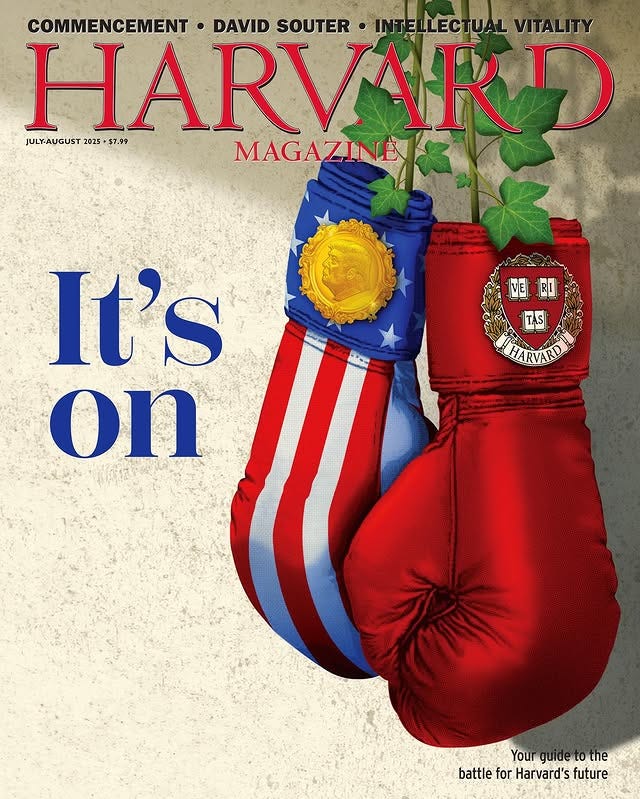Seizing the Moral High Road When Discussing the Resolution of the Trump Administration's Assault Against Harvard: Why Harvard Must Demand the Ending of the Prosecution/Persecution of Ksenia Petrova
Harvard must stand in defense of our Republic and the principles of academic freedom by opposing DoJ's and DHS’s misuse of our Government's power against U.S. citizens and other persons in the U.S.
If Harvard intends to negotiate in line with the principles it has taught the world—principles embodied in its Negotiation and Mediation Clinical Program *(https://hls.harvard.edu/hls_clinic/negotiation-mediation)*—then it must insist, as a precondition of any talks with the Trump Administration, on the immediate dismissal of all charges against Harvard researcher Ksenia Petrova (https://www.thecrimson.com/article/2025/6/13/petrova-release-criminal-custody) and demand appropriate compensation for the harm she has endured.
Harvard must not abandon its own.
As reported by The Washington Post (https://www.washingtonpost.com/education/2025/6/24/with-stakes-high-white-house-pushes-negotiations-with-harvard) and The Harvard Crimson (https://www.thecrimson.com/article/2025/6/25/harvard-faculty-trump-talks), the Trump Administration has opened a round of negotiations with Harvard, ostensibly about student access and institutional compliance. But this is no good-faith policy discussion. It is a coercive campaign backed by retaliatory tactics—most glaringly the targeting of Petrova.
Petrova’s prosecution is not routine. It appears to be a calculated move designed to create a chilling effect, using legal tools to suppress dissent and bend academic institutions toward political compliance. Her offense? She is a Russian national who has publicly condemned her government’s invasion of Ukraine and denounced war crimes committed by the Putin regime.
This is not the rule of law as it is taught in our schools at all levels, or as the United States has long been respected for around the world. It is a Trumpian adaptation of a Putin-style tactic—a calculated maneuver lifted directly from the authoritarian playbook. Harvard must not countenance the Department of Justice and the Department of Homeland Security’s perversion of the legal system into tools of political coercion.
For historical and comparative context, see e.g. “Law as Politics: The Russian Procuracy and Its Investigative Committee,” 8 Columbia Journal of East European Law, Vol. 2, No. 2, pp. 143–194 (2008), by Ethan S. Burger, Harvard ‘81 & Mary S. Holland, Harvard ‘81, available at: https://papers.ssrn.com/sol3/papers.cfm?abstract_id=1104700. See also, a related presentation, “Law as Politics: The Russian Procuracy and Its Investigative Committee,” at: https://www.slideshare.net/slideshow/2008-russian-procuracys-investigative-committee-presentation/793088 (showing how President Putin used Russian legal institutions against his political opponents).
The Magna Carta and the Rule of Law
This moment demands that we recall the foundational principle of Western legal tradition: that even the sovereign is subject to law. That concept, first enshrined in 1215’s Magna Carta, underpins both the U.S. Constitution and Harvard Law School’s curriculum. Due process, equal protection, and the right to resist arbitrary detention are not mere ideals—they are cornerstones of a free society.
Harvard’s role in shaping this legacy obligates it to speak clearly. Silence now would mark not neutrality but abdication.
In a recent issue, Harvard Magazine aptly captured the gravity of the current standoff: “The stakes are so high that we have no choice.” But there remains a choice in how Harvard responds—whether it capitulates to political pressure or reaffirms its core values.
A Teachable Moment for Congress, the Media, and the Nation
This episode should be a wake-up call:
Congress must investigate the abuse of prosecutorial authority and federal retaliation against dissenters.
The media must call this what it is: a political crackdown masquerading as immigration enforcement.
The public must recognize the danger in allowing law to be repurposed as a tool of ideological enforcement.
Harvard has long taught that principled negotiation—Getting to Yes, as defined by Harvard Professors Fisher (deceased), Ury, and Patton—requires more than compromise. It demands moral clarity, transparency of interests, and the courage to name coercion when it appears.
To proceed with negotiations while Petrova remains under federal threat would not only be strategically unsound—it would be morally indefensible.
Petrova’s freedom should not be a bargaining chip. Her defense should be the starting point of any negotiation with the federal government.



